Happy Families
Chad Valley Happy Families originally designed by Max Pollock (1887-1943).
The Chad Valley Games company was one of the UK's leading toymakers for most of the 20th century but was taken over by Palitoy in 1978. The brand name was bought by Woolworths in 1988 and remained in use until that company's closure due to insolvency. Home Retail Group, the parent company of retailers Homebase and Argos, purchased the brand in 2009. The Chad Valley brand is now available exclusively at Argos.
The pre-WW1 set shown here is one of several ‘Happy Families‘ games published by Chad Valley Games. It was originally designed by Max Pollock (1887-1943) but re-drawn and modernised, printed by chromo-lithography and re-published by Chad Valley Games, c.1910.
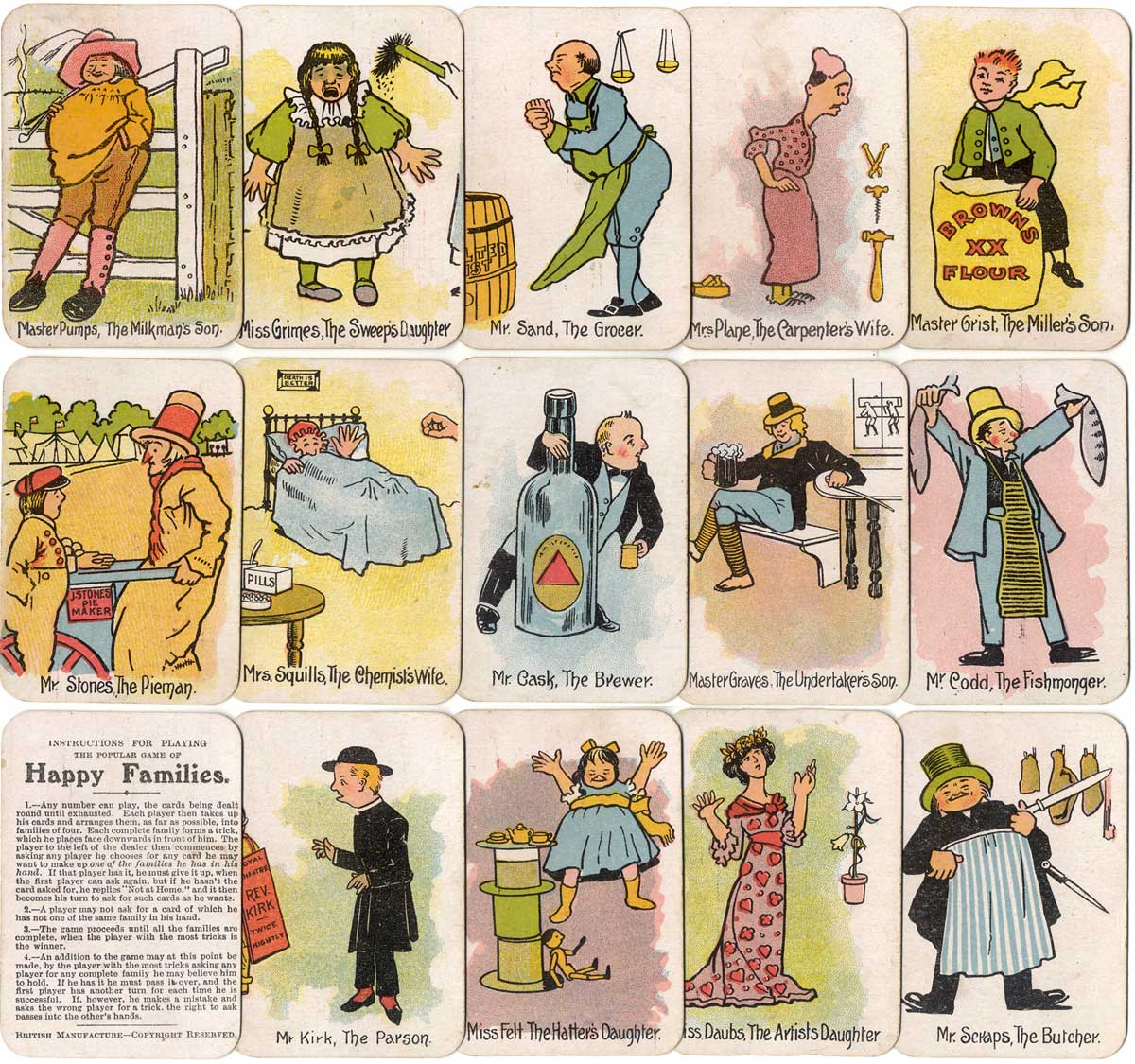
Above: cards from “The Round Card Game of Happy Families”, originally designed by Max Pollock (1887-1943) but re-drawn and modernised, printed by chromo-lithography and published by Chad Valley Games, England, c.1910. The set has sixteen families, making a total of 64 cards + rules card.
“Happy Families” - original designs by Max Pollock, c.1895

Above: 1895 edition of Max Pollock's “Happy Families” showing the original drawings coloured in red, black & green. These drawings were redrawn and modernised as they had begun to look too old fashioned after the turn of the century.
By Rex Pitts (1940-2021)
United Kingdom • Member since January 30, 2009
Rex's main interest was in card games, because, he said, they were cheap and easy to get hold of in his early days of collecting. He is well known for his extensive knowledge of Pepys games and his book is on the bookshelves of many.
His other interest was non-standard playing cards. He also had collections of sheet music, music CDs, models of London buses, London Transport timetables and maps and other objects that intrigued him.
Rex had a chequered career at school. He was expelled twice, on one occasion for smoking! Despite this he trained as a radio engineer and worked for the BBC in the World Service.
Later he moved into sales and worked for a firm that made all kinds of packaging, a job he enjoyed until his retirement. He became an expert on boxes and would always investigate those that held his cards. He could always recognize a box made for Pepys, which were the same as those of Alf Cooke’s Universal Playing Card Company, who printed the card games. This interest changed into an ability to make and mend boxes, which he did with great dexterity. He loved this kind of handicraft work.
His dexterity of hand and eye soon led to his making card games of his own design. He spent hours and hours carefully cutting them out and colouring them by hand.

Leave a Reply
Your Name
Just nowRelated Articles

Round the World Happy Families
Round the World Happy Families by Chiefton Products Ltd of Bristol, c.1950s.
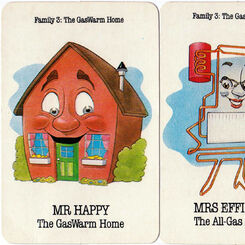
Gas Warm Homes
Gas Warm Homes Happy Families game published by British Gas, c.1980.
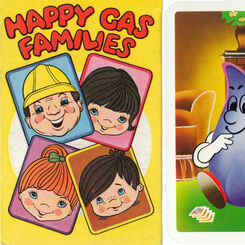
Happy Gas Families
Happy Gas Families published by British Gas, c.1985.
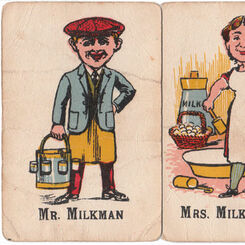
Trades People Happy Families
Happy Families card game depicting trades people from 1920s.
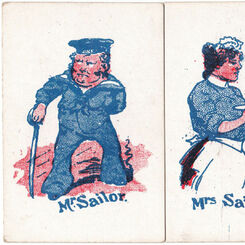
Merry Families
Merry Families #2 (Occupations), by Multum in Parvo Co. Ltd., c.1890.
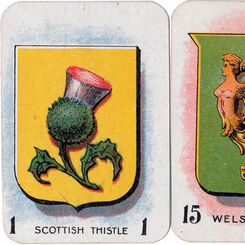
Blaze
“Blaze” was introduced just before Johnson Bros changed their name to Chad Valley Ltd, c.1920.

Spears Happy Families
Spears Happy Families.
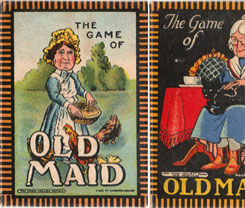
The Game of “Old Maid”
Two different editions of “The Game of Old Maid” by the Chad Valley Games Co.
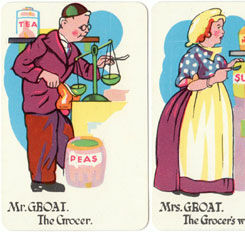
Happy Families, c.1950
Chad Valley “Happy Families” card game, c.1950.
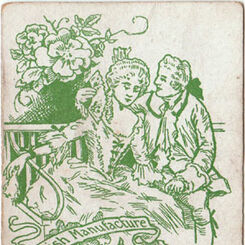
Happy Families, c.1930
“Happy Families” game published by Chad Valley c.1930 drawn in the slightly grotesque style of the V...
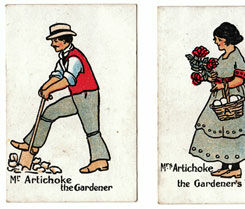
Linda Edgerton Happy Families
Linda Edgerton ‘Happy Families’ published by Chad Valley Games, Harborne, England, c.1925.
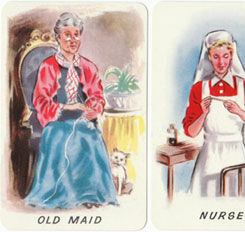
Old Maid
“Old Maid” card game manufactured by Chad Valley Co Ltd, mid-1950s.
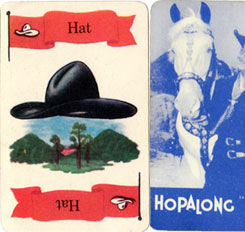
Hopalong Snap
‘Hopalong Cassidy Snap’ published by Chad Valley, 1950s.
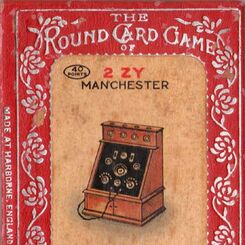
Sparx
‘Sparx’ card game, or ‘Listening In’, published by Chad Valley Games, c.1925.
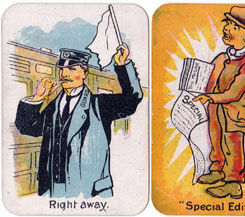
Special Edition Snap 1912
Chad Valley Special Edition ‘Snap’ card game, 1912.
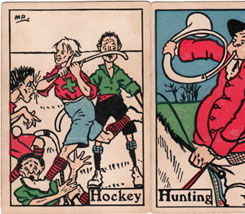
Chad Valley ‘Sporting Snap’ c.1895
Chad Valley ‘Sporting Snap’ card game designed by Max Pollock c.1895.
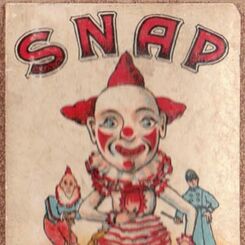
Snap 1930
Chad Valley ‘Pantomime Snap’ card game, 1930.
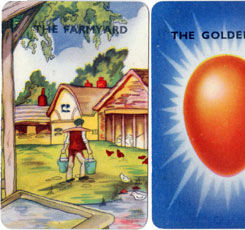
Golden Egg
Chad Valley “Golden Egg” card game.
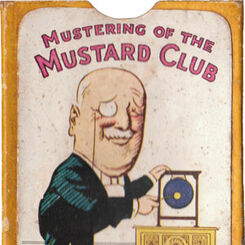
Mustering of the Mustard Club
The “Mustering of the Mustard Club” was one of many promotional items produced by Colman's for the M...
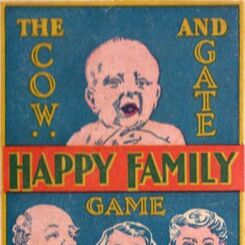
Cow & Gate Happy Family Game
Cow and Gate Happy Family game was issued around 1928 to promote nutrition products.
Most Popular
Our top articles from the past 60 days


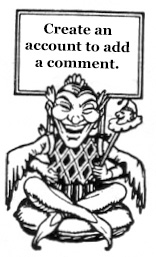 Your comment here. Your comment here. Your comment here. Your comment here. Your comment here. Your comment here. Your comment here. Your comment here. Your comment here. Your comment here. Your comment here. Your comment here. Your comment here. Your comment here. Your comment here. Your comment here. Your comment here. Your comment here. Your comment here. Your comment here. Your comment here. Your comment here. Your comment here. Your comment here. Your comment here. Your comment here. Your comment here. Your comment here. Your comment here. Your comment here. Your comment here. Your comment here.
Your comment here. Your comment here. Your comment here. Your comment here. Your comment here. Your comment here. Your comment here. Your comment here. Your comment here. Your comment here. Your comment here. Your comment here. Your comment here. Your comment here. Your comment here. Your comment here. Your comment here. Your comment here. Your comment here. Your comment here. Your comment here. Your comment here. Your comment here. Your comment here. Your comment here. Your comment here. Your comment here. Your comment here. Your comment here. Your comment here. Your comment here. Your comment here.




















